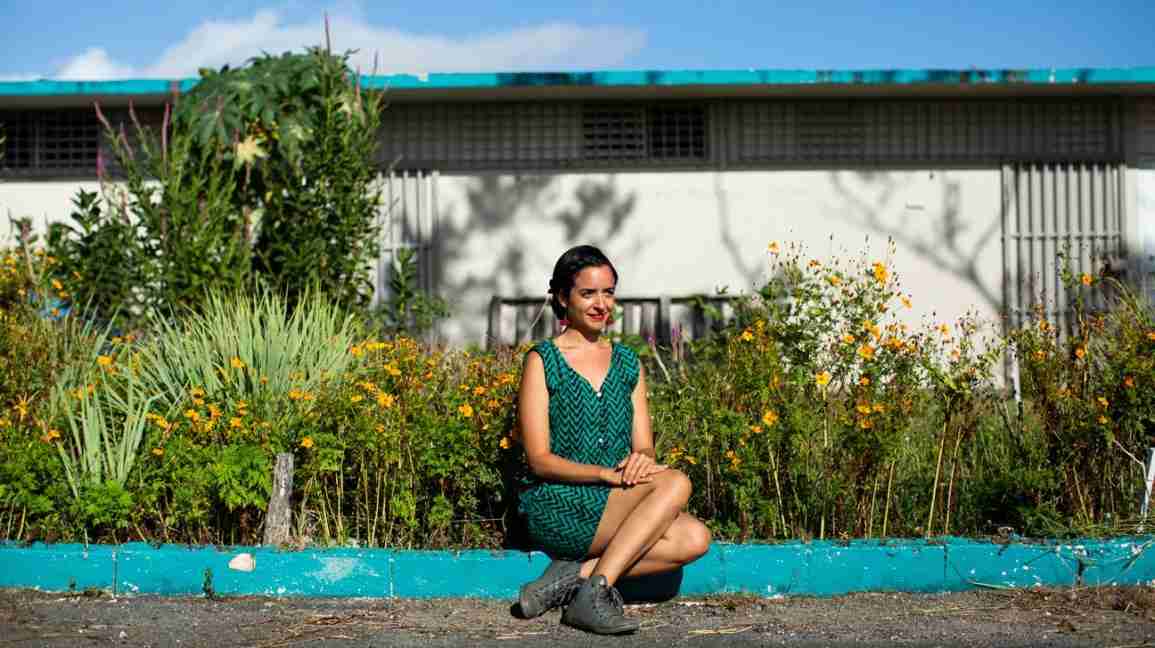
Carol Ramos-Gerena is on a mission to transform Puerto Rico’s food system. After all, why does a place depend on imports from abroad for 85 percent of its food when its climate can support year-round farming?
“With Puerto Rico’s historical colonization, one concrete way that we can decolonize our country is by decolonizing our palate, our plate, and the way that we relate [to] our food and natural resources,” she says.
Inspired by a dissertation from Puerto Rico’s former Secretary of Agriculture Myrna Comas Pagan, Ramos-Gerena has already started planting the seeds of self-sufficiency in the local food system.
She’s spent the last decade supporting community gardens at public schools and giving talks on agroecology and food sovereignty.
This fall, the 29-year-old will start her doctoral program in food system planning at the State University of New York at Buffalo, which she hopes will give her the tools she needs to help make Puerto Rico’s food system more equitable, independent, and resilient.
We asked Ramos-Gerena about her studies, goals, and obstacles. Here’s what she had to say.
This interview has been edited for brevity, length, and clarity.
What prompted you to get into your field of study?
I am deeply influenced by the inequalities and injustices in Puerto Rico’s food system caused by our colonial relationship with the U.S. and exacerbated by recent natural disasters and health crises.
Throughout the years, it has become clear to me how these food system inequalities and injustices should be addressed on a larger scale.
When Myrna Comas Pagan’s work was published, I was doing my bachelor’s degree in biology and actively participating in a student agriculture association, where I learned about agroecology.
The critical consciousness and conviction of the students that were part of this association, and how they put words into action, motivated me to join, support, and develop a few agroecological initiatives around Puerto Rico over the past 10 years.
Please tell us about the work you’ve already done, as well as your goals for the future.
I have supported the development of around 13 school and community gardens and offered over 30 talks on agroecology and food sovereignty across the country, mostly through volunteer work.
Just after hurricanes Irma and Maria hit Puerto Rico, the Berwind Country Club school community accepted my support, and we built an urban agroecology project, which now extends from the Berwind Middle School to the housing projects surrounding it.
This project has since gotten funding for an agroecology summer camp for 100 students, a trip for two teachers to travel to the American Community Garden Association in Atlanta, and the construction of a compost station, greenhouse, and garden, among other initiatives.
Inspired by these experiences, I hope that in the future I am better equipped to support a national and international team of educators, farmers, students, and other actors in the transformation of the food system of Puerto Rico.
What obstacles have you encountered as you’ve worked toward your goals?
One of the obstacles I’ve faced in my academic work is the lack of public information and data about our food system. I will probably continue facing barriers to accessing data as I pursue my doctorate.
Through my program and the University at Buffalo’s Food System Planning and Healthy Community Lab, I hope to fill in some of the information gaps.
I am especially interested in building knowledge of who’s who among our local agroecological farmers and how they connect with each other and fit into the overall food system. I’d also like to document their resiliency and resistance under layers of oppression and disasters.
Since food has served as a major inspiration for your work and ambitions, can you please tell us about your favorite food memory?
In Puerto Rico, we have the saying “Dime con quién andas y te diré quién eres” (tell me who you hang out with and I’ll tell you who you are).
It’s true — most of my friends are food lovers, urban farmers, plant lovers, committed educators, and people who believe in and work toward the transformation of the food system in Puerto Rico.
We have [celebratory] potlucks using what we have cultivated from our urban gardens, shared seeds and tools, and even coordinated family meetings to share knowledge on food sovereignty, nutrition, and agroecological practices. We have become an extended eating table and a corridor of edible backyard projects.
My immediate family also played a big role in making healthy food a priority while growing up. I hope that same experience is still available for future generations of families, and that they can create their own healthy local food communities.
Why are issues related to food important to you?
The way that I was raised had a lot to do with why I’m hooked on food issues and food education.
As the daughter of two first-generation college students, I have witnessed how access to education, health, and housing allows for a very diverse quality of life within the same family.
I was born in a middle-class family [with] a mother who came from the countryside of Puerto Rico and was exposed to the traditional, tropical agriculture and flavors of the rural landscape, and a father who was raised in an urban public housing project and had very limited access to local, healthy food.
Raised in poor families, both of my parents graduated from college and committed themselves to providing my brother and me with the quality of life they had wished for, including healthy food, quality education, healthcare, stable housing, and numerous extracurricular activities.
Growing up, I noticed how these opportunities and experiences were different to those of the rest of my family members, which always challenged me to be aware of these privileges.
What message would you like to give Puerto Ricans about their food system?
We all have a responsibility to fix the injustices and inequalities of our colonial and industrialized food system, make it less vulnerable, and work toward food equity and sovereignty.
It’s not enough to leave the transformation to agroecological producers and responsible consumers. We need the entire population to have food literacy, understand agriculture, and know how to advocate for transformation and equity in the food system at the national level.
Joni Sweet is a freelance writer who specializes in travel, health, and wellness. Her work has been published by National Geographic, Forbes, the Christian Science Monitor, Lonely Planet, Prevention, HealthyWay, Thrillist, and more. Keep up with her on Instagram and check out her portfolio.



